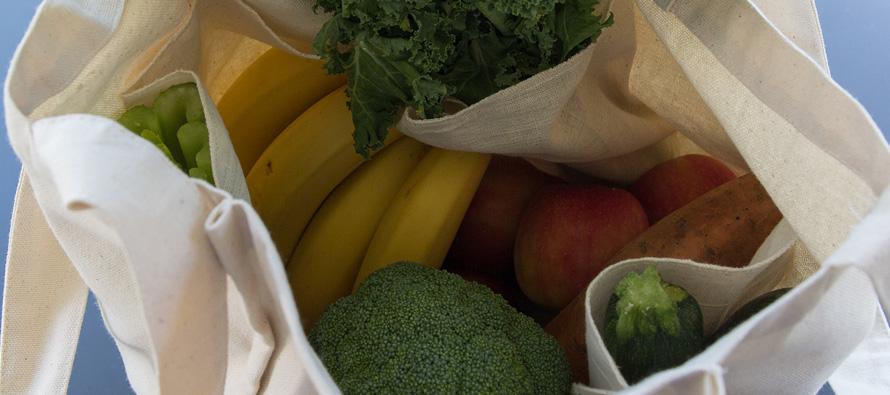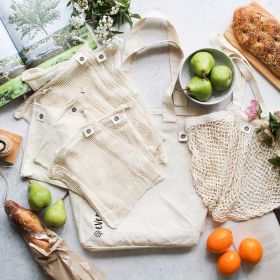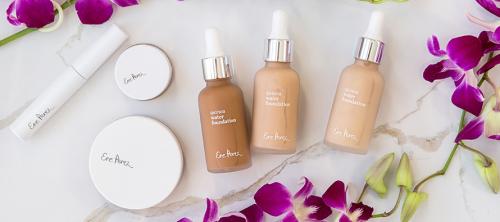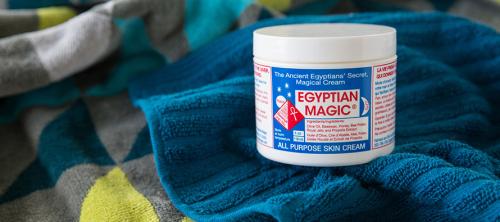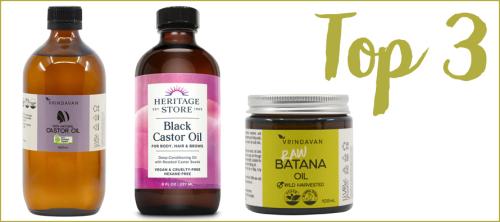Your guide to the greener options in reusable shopping bags
Both Woolworths & Coles announced in July 2017 (during Plastic Free July) that they would phase out all single use plastic bags over 12 months for greener options. Early April 2018, the supermarkets announced that they started the roll-out 3 months early in some of their stores. Many were caught out. There was social outrage. The supermarkets caved and delayed and gave out bags for free for a lot longer than originally scheduled.
Since this roll-out, there's really no need to be hunting down standard grocery shopping bags online, most stores sell them at the checkout now. If you're looking for eco-options, what you're being offered at the checkout may not be all they're cracked up to be.
Today we discuss how eco friendly the in-store alternatives will be and what the greener options in reusable shopping bags are. We discovered from our research that many alternatives to the single use plastic bags are worse for the environment than we thought.
In-Store Alternatives - are they greener options?

For the large majority of users, we don't think so. We don't want to see less eco-friendly options replace single use thin plastic bags. Here's some information to consider when choosing to buy them.
THE 'GREEN' BAG - named for their colour, not necessarily their eco-friendliness, the 'green bag' (available in other colours too) have been available in supermarkets for years. Since is takes considerably more resources to create larger and thicker bags, the number of times they need to be used to be an eco option needs to be taken in to account. According to this article on the ABC website, a study by Dr Verghese says they need to be used 104 times (once every week for two years) to be considered a more environmentally friendly option than single use plastic bags. (Note: Choice say only 23 times to be used)
During these 104 uses, they should be machine washed on a regular basis so they don't harbour bacteria that may transfer to fresh produce. We surveyed our audience on social media and while a small number of people successfully wash and re-use them over this time period, most people said they lasted around 6 months. Others said far less, citing them perishing in the sun and tearing as the main reasons. At end of life they 'can' be recycled, but they have to get shipped overseas for that. Now that China isn't taking our garbage for recycling, there's every chance that's no longer possible.
We also had a handful of people say they planted produce in them and buried them in their garden. THIS IS NOT A GOOD IDEA. They are made of polypropylene plastic and will break down and permanently leave micro-plastic pieces in your soil.
THE THICKER PLASTIC BAG - we learnt from the War On Waste last year that Tasmania got around the ban by supplying or selling thicker plastic bags. Unless you re-use them repeatedly, not a great long term eco-option either. If they get used once and get thrown away, they are a worse option than what we're getting rid of. We haven't been able to find any exact research on the number of uses to make these a more eco-friendly option than the thin bags. Our educated guess suggests it needs to be somewhere up around the 104 times the green bags need to be used, and there's very little chance that they're surviving that kind of use.
THE PAPER BAG - great option right? Think again. According to Choice, for single use, paper and biodegradable starch bags are at the bottom of the list. Why? They use more energy and materials to make than the thin plastic bags and there is little advantage to them being biodegradable because they are rarely in a position in landfill to break down correctly.
NATURAL FIBRES - if your supermarket offers cotton or jute options, they are the best choice for an in store reusable. Jute is actually the winner, but they're hard to come by. They will always have a dearer price tag on them, even in the supermarket, but they are the only decent eco choice available.
* photos above via Woolworths website
What we need are sustainable, long wearing options
One of my favourite sayings is Buy Quality Buy Once. Nothing is cheap in the long run if it has a short shelf life and needs to be replaced. We have been road testing a variety of reusable shopping bags that you will buy once and have for years to come. Here's our favourite choices.
Polyester Foldable / Stuffable Bags
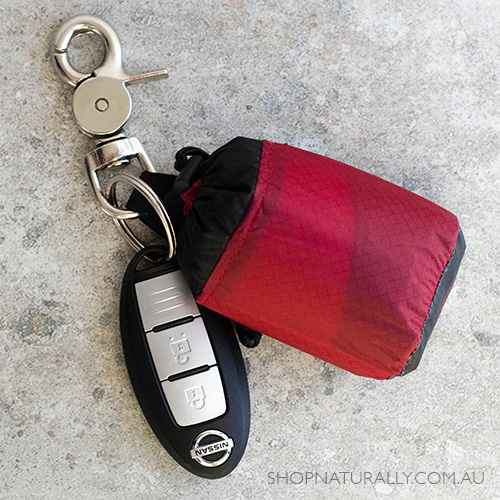
We were always in love with the Ultrasil range from Sea To Summit, which are sometimes available in our store. The best way to describe the Ultrasil is 'ultra light parachute material'. While they are not made from natural fibres like some of our other options, they are rated to hold up to 130kg with a 25 litre capacity without tearing and they pack up so small (at a weight of just 46g) that you can keep one hanging off your keyring for those times when you're just 'popping in' to grab a few things and you have forgotten to bring a bag. We have had lost of men buy the bags for this very reason, women too.
They are an initial investment, but you'll only ever have to buy this bag once. There are plenty of other budget nylon / polyester options, even bags from the supermarket starting at $2. Just make sure they are stitched well or easily repairable as you don't want to be tossing / replacing these. Brands like Loqi, Envirosax and hundreds more all make similar bags.
Calico & Canvas - natural fibre options
Want natural fibres with some style and flair without breaking the budget? There are plenty of cotton bags on the market, we love the one above from Green Essentials as it has some internal pockets. If you're choosing cotton, make sure it lasts. They use a lot of water to produce and are not the most eco-friendly natural fibre option unless you use them for years.
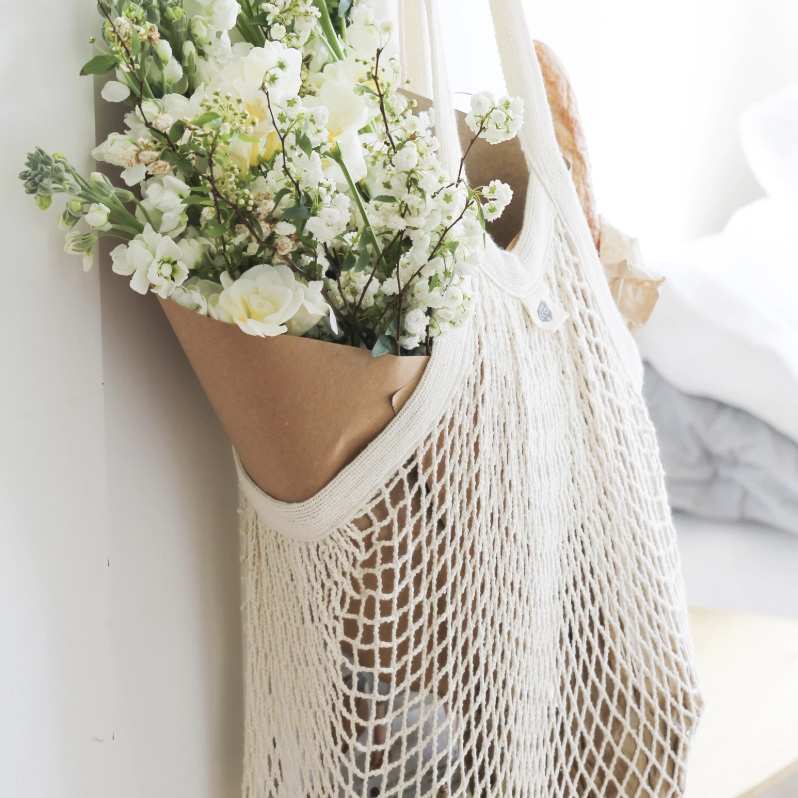
String Bags
String Bags are making a comeback. They have pro's and con's. They will bend and stretch in to any shape you like. When you're filling them, they won't stand up, so be prepared to hang them over something or use one hand to hold them up. Australian eco savvy brand Ever Eco do an unbleached Cotton Net Bag with both a long and a short handle.
Produce Bags
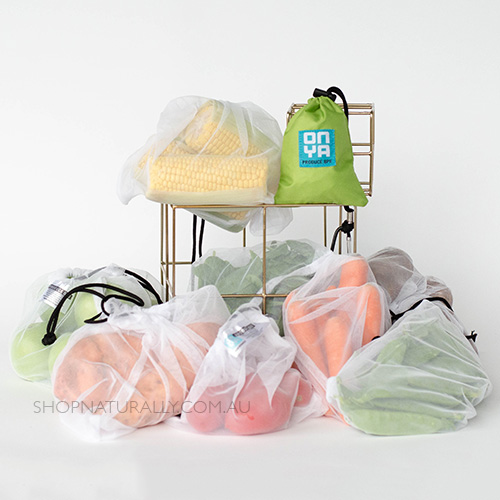
While the supermarkets are banning the plastic bags at the checkout, they will still be supplying the rolls of plastic bags in the fresh produce section. You don't have to use them though. You can take your own produce bags to the supermarket. We have lightweight mesh options made from recycled PET bottles (I still have a set I bought 8 years ago) and natural fibre options as well (they are a little heavier for the scales).
Bread Bags
If you go to the baker and buy full loaves, you don't have to take them home in plastic bags (or paper). We have two different options for reusable bread bags. From Onya, made from recycled PET bottles, these bags are shaped to take a regular loaf, and will take the high top loaf from Baker's Delight (we tested it). They're great in the freezer to prevent freezer burn. From 4myearth (pictured above), a wider and roomier bag made from cotton with a biodegradable lining at end of life. 4myearth also make smaller food bags (around half sized), lunch pockets and wraps plus plate and bowl covers, all from the same earth friendly materials. Tne Onya Bag doubles as a shopping bag when closed, giving you a handle to carry it with. No need for a shopping bag if you're just grabbing a loaf.
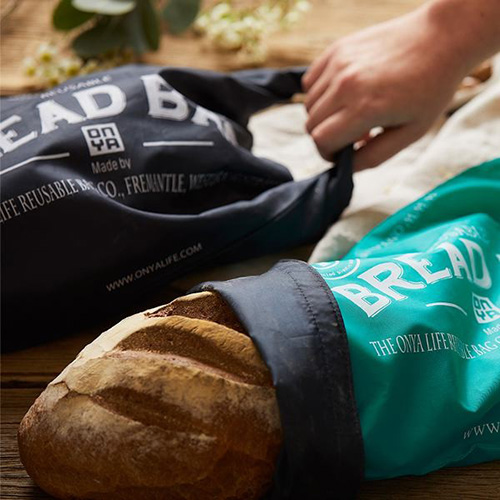
Originally published April 2018 as "Are you ready for the ban on plastic shopping bags", updated May 2019
